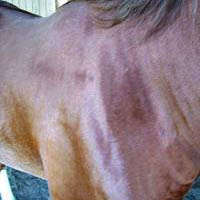| Home Medical Index | First Posted May 25, 2008 Jan 21, 2020 | |
Sweeney Shoulderby Debora Johnson You notice that your horse is lame or not moving properly. There seems to be some change in the muscle tone in the shoulder area. The vet is called and tells you that your horse has sweeney shoulder. What is that? What Is Sweeney Shoulder?
Sweeney shoulder is the atrophy of muscles in the shoulder area. Some of the muscles that may be involved are supraspinatus, infraspinatus, and triceps. The lack of use of the muscles usually follows some sort of trauma or any lesion of the limb or foot. Often the nerves are also involved (sprascapular nerve involvement). This nerve supplies the muscles. Causes
Trauma of some sort is often the cause. Traumatic injury caused by the horse running into an object such as a fence, tree, or another horse. Also, a kick can be the culprit. A fracture can cause sweeney shoulder. If there is no visual trauma it is often hard to diagnose sweeney shoulder until there is visible atrophy. The shoulder blade muscles shrink up near the withers and narrow near the point of the shoulder. Also, there is a noticeable hollowing on each side of the spine of the scapula, especially in the infraspinous area, resulting in prominence of the spine. Another sign of sweeney shoulder is the horse's inability to extend the shoulder. In some cases there may eventually be a looseness in the shoulder joint. The shoulder will look like it is slipping. Treatment
When treating sweeney shoulder the cause needs to be determined. Massage or electrical stimulation may be of help for atrophy. Anti-inflammatory drugs are often given. Sometimes surgery is performed. Prognosis
If the cause can be determined and removed, the prognosis is often good. If there is neurogenic atrophy, the prognosis is guarded. Mild nerve damage should recover in 6-8 weeks. A cut or scarred nerve is considered more severe. Also, if there was a loss of blood supply healing of the damaged area is usually diminished. Nerves can regenerate, however, in severe cases it may take more than a year or perhaps, not at all. "Such cases are candidates for surgical release. If the nerve has been severed, recovery is unlikely." Sweeney Shoulder |